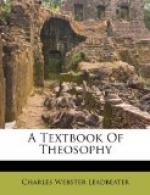Every thought builds a form; if the thought be directed to another person it travels to him; if it be distinctly selfish it remains in the immediate neighbourhood of the thinker; if it belongs to neither of these categories it floats for awhile in space and then slowly disintegrates. Every man therefore is leaving behind him wherever he goes a trail of thought forms; as we go along the street we are walking all the time amidst a sea of other men’s thoughts. If a man leaves his mind blank for a time, these residual thoughts of others drift through it, making in most cases but little impression upon him. Sometimes one arrives which attracts his attention, so that his mind seizes upon it and makes it its own, strengthens it by the addition of its force, and then casts it out again to affect somebody else. A man therefore, is not responsible for a thought which floats into his mind, because it may be not his, but someone else’s; but he is responsible if he takes it up, dwells upon it and then sends it out strengthened.
Self-centred thought of any kind hangs about the thinker, and most men surround their mental bodies with a shell of such thoughts. Such a shell obscures the mental vision and facilitates the formation of prejudice.
Each thought-form is a temporary entity. It resembles a charged battery, awaiting an opportunity to discharge itself. Its tendency is always to reproduce its own rate of vibration in the mental body upon which it fastens itself, and so to arouse in it a like thought. If the person at whom it is aimed happens to be busy or already engaged in some definite train of thought, the particles of his mental body are already swinging at a certain determinate rate, and cannot for the moment be affected from without. In that case the thought-form bides its time, hanging about its object until he is sufficiently at rest to permit its entrance; then it discharges itself upon him, and in the act ceases to exist.
The self-centred thought behaves in exactly the same way with regard to its generator, and discharges itself upon him when opportunity offers. If it be an evil thought, he generally regards it as the suggestion of a tempting demon, whereas in truth he tempts himself. Usually each definite thought creates a new thought-form; but if a thought-form of the same nature is already hovering round the thinker, under certain circumstances a new thought on the same subject, instead of creating a new form, coalesces with and strengthens, the old one, so that by long brooding over the same subject a man may sometimes create a thought-form of tremendous power. If the thought be a wicked one, such a thought-form may become a veritable evil influence, lasting perhaps for many years, and having for a time all the appearance and powers of a real living entity.
All these which have been described are the ordinary unpremeditated thoughts of man. A man can make a thought-form intentionally, and aim it at another with the object of helping him. This is one of the lines of activity adopted by those who desire to serve humanity. A steady stream of powerful thought directed intelligently upon another person may be of the greatest assistance to him. A strong thought-form may be a real guardian angel, and protect its object from impurity, from irritability or from fear.




